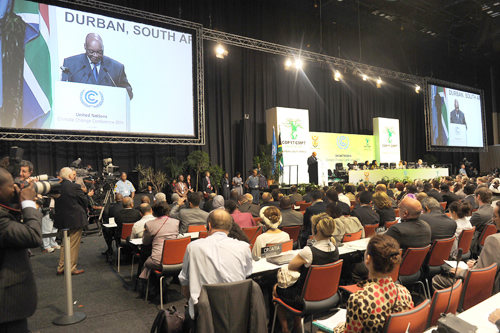|
 |
|
HERE WE GO AGAIN: Delegates attend the opening ceremony of the UN Climate Change Conference in Durban on November 28 (XINHUA) |
"As you seek constructive ways forward on the Kyoto Protocol, I urge you to remember 'It always seems impossible until it is done,'" said Figueres.
Figueres made the statement in the light of the huge difficulties in the adoption of the second commitment period of the Kyoto Protocol.
Prior to this conference, Japan, Russia and Canada said they would not sign the second commitment period. Canada declared it will not make further cuts in its greenhouse gas emissions under the Kyoto Protocol, and will formally withdraw from the protocol before this Christmas.
The EU has showed a willingness to extend its commitments but also suggested a broader global pact engaging all major economies.
"Global action is needed to achieve the deep cuts in global emissions necessary to avert dangerous climate change. This action must be led by the major economies in both the developed and the developing worlds," said Connie Hedegaard, EU Commissioner for Climate Action, on the sidelines of the Durban conference.
If the new system comes into force earlier, Europe could have a short commitment period instead of a longer one, she said.
China, along with other BASIC countries, has always been actively pushing for the second period of the Kyoto Protocol.
"The definition of the second commitment period of the Kyoto Protocol is the main priority for Durban," said Su Wei, head of the Climate Change Department of China's National Development and Reform Commission in a statement on behalf of the BASIC countries.
The Kyoto Protocol is the cornerstone of the climate regime and an essential foundation of an ambitious rules-based system, said Su.
"Sustainable development and poverty eradication remain urgent challenges and overriding priorities for our countries. Yet our countries have pledged ambitious actions to reduce emissions at substantial cost to their economies," said Su.
Therefore, the BASIC countries call upon the developed countries to rise up to their historical responsibilities and take the lead by undertaking ambitious and robust mitigation commitments, said Su.
"We believe that the Durban conference should achieve a comprehensive, fair and balanced outcome to enable the full, effective and sustained implementation of the UNFCCC and its Kyoto Protocol, in accordance with the principles of equity and common but differentiated responsibilities and respective capabilities, and fulfill the mandate of the Bali Roadmap in the two-track process of negotiations," said Su.
The major problem with the Green Climate Fund is the source of the capital, said the Energy Foundation's Yang.
The Green Climate Fund is a positive outcome of the UN Climate Change Conference in Cancun, Mexico, last year. It addresses both fast-start and long-term financing. Building on the commitment by developed countries to transfer $100 billion a year by 2020 to developing countries for adaptation and mitigation, the Green Climate Fund will be essential for channeling such funds to developing countries.
| 